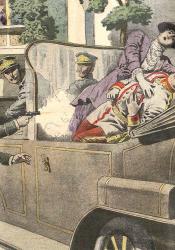The Assassination of Archduke Franz Ferdinand
On the twenty-eighth of June, 1914, a young man toppled the fragile structure of world order with two bullets—one for Archduke Franz Ferdinand of Austria-Hungary, the other for the Archduke’s wife, Sophie.
The royal couple were invited to the Bosnian capital of Saravejo, which was annexed by the Austrian empire in 1908, by General Oskar Potoirek to attend a speech in the city hall and inspect imperial military personnel. The shooting occurred just hours after a botched bombing attempt, about which the Archduke is recorded to have said to the military governor, “What is the good of your speeches? I come to Sarajevo on a visit, and I get bombs thrown in my face. It is outrageous” (The Times). After the failed bombing, the speech and the inspection of Sarajevo’s military parade, riding in the back of a roofless motor-car—as was common for the time—through the streets of Sarajevo among a crowd of thousands gathered to see the royal couple, they were shot dead (The Times).
After the two shots were fired, the young gunman swallowed a cyanide pill but somehow survived (Jay 19). He was promptly pointed out by the crowd and arrested by Bosnian officials. That young gunman was nineteen-year-old Gavrilo Princip, misidentified by The Times in London as Nadjeliko Cabrinovitch just a day after it happened. Gavrilo Princip was one of three men involved in the assassination plot directly, and a member of the Black Hand, a group of Serbian nationalist extremists (Jay 19). He was too young to be executed by Austria-Hungarian law, so he was instead sentenced to life in prison in Theresienstadt, where he wasted away in solitary confinement (Jay 19). The Black Hand’s actions, carried out by Gavrilo Princip’s hand, is often considered to be the straw that broke the camels back with regards to stoking the flame of the first world war (Schmitt 70).
This event is important to highlight when exploring historical examples of “toxic patriotism”, as Gavrilo Princip’s nationalistic mindset is ultimately what led to his involvement with the Black Hand and eventually to his shooting of the Archduke. Moreover, although Princip ultimately died for his actions, he was hailed as a martyr by many who viewed the annexation of Sarajevo and Bosnia as a bad thing, thus further stoking a ravenous nationalistic mindest which spiraled into WW1 (Jay 20). Similarly, this sentiment was mirrored in the attitudes of many of the nations which then involved themselves in the war—this idea of the romanticisation or the idealization of one’s homeland. To Princip, his homeland was under siege by a foreign power, infected and otherwise beautiful, and that is a state of mind which mirrors many contemporary examples of toxic patriotism—namely the January 6th insurrection at the United States capitol building.
In both this event and the insurrection of the U.S. capital building, the party responsible for the violence believed they were engaging in a fight to rid their homeland from an occupying force which tainted its natural goodness.
Primary Source:
"Austrian Heir and his Wife Murdered." The Times, 29 June 1914, p. 8. Gale Primary Sources, https://go-gale-com.
Other Works Cited:
Jay, Martin. "The Manacles of Gavrilo Princip." Salmagundi, no. 106/107, 1995, pp. 14-21. JSTOR, https://www.jstor.org/stable/40548800.
Schmitt, Bernadotte E. "The Origins of the War of 1914." The Journal of Modern History, vol. 24, no. 1, March 1952. JSTOR, https://www.jstor.org/stable/1871982.

